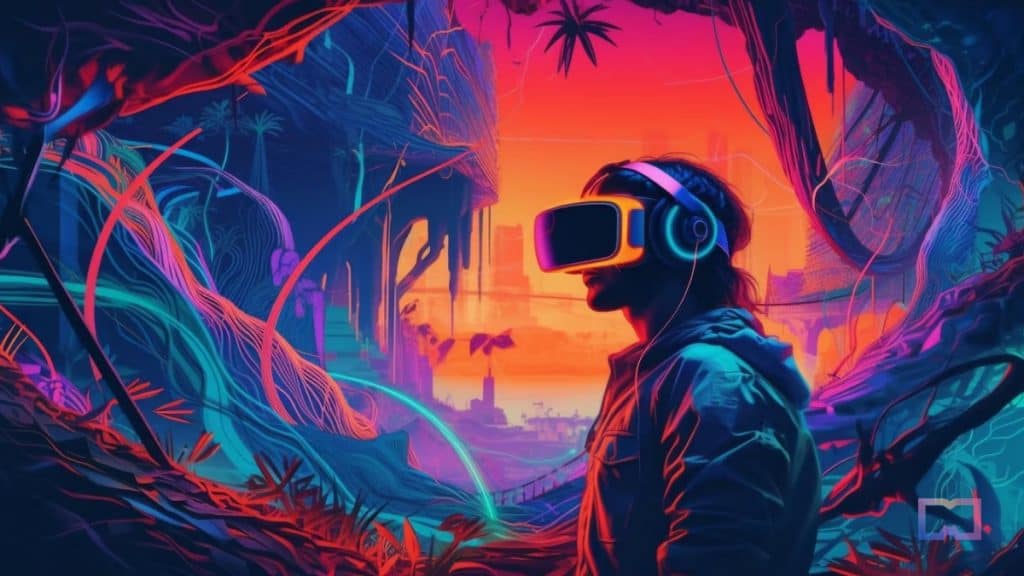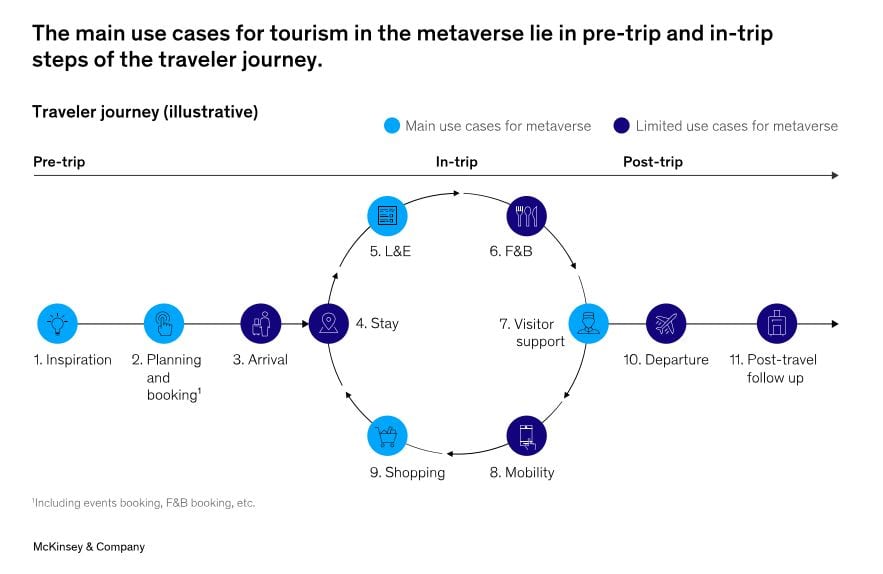
The metaverse fueled by VR/AR technology has the strong potential to reshape our reality, including traveling. According to research by McKinsey, the travel industry could gain more than $20 billion by 2030 from the metaverse’s immersive and captivating offerings.
“Imagine a future where your travel choices have no geographic constraints. Where you can join your friends in the front row of a concert by your favorite star—but the crowd is 300 million strong, your friends are on the other side of the world, and it’s all happening at the Great Pyramid of Giza. Later you’ll do some shopping at the virtual souk and take a digital Nile cruise, before teleporting back home in an instant,”
McKinsey envisioned metaverse-powered travels.
Early trends in metaverse applications showcased the technology’s possibilities that redefine exploration. For instance, French start-up Histovery used augmented reality to create an immersive exhibition on the history of Notre Dame de Paris. Meanwhile, MGM Resorts International turned to virtual reality to enhance staff training and onboarding. Virtual platforms like ZEPETO World and the BCB Group’s metaverse city offer virtual travel experiences to global landmarks, fostering edutainment and retail opportunities. Moreover, Saudi Arabia’s Royal Commission for AlUla placed the ancient city of Hegra in the metaverse, allowing digital tourists to explore its wonders.
The report highlights that the main use cases for the metaverse lie in leisure and entertainment, inspiration and planning, visitor support, as well as shopping and booking. These areas show significant potential for leveraging the metaverse to enhance the traveler experience.

McKinsey argued that forward-thinking tourism industry players could position themselves at the forefront of disruption. The strategies by early metaverse adopters fall into two categories: virtual event centers and recreations of iconic landmarks.
Virtual event centers have already demonstrated potential, attracting business gatherings and entertainment with ticket sales, attendance fees, and retail opportunities. On the other hand, extender reality (XR) landmarks provide immersive spaces where visitors can explore, socialize, shop, and learn while gaining exposure to lesser-known destinations.
After overcoming challenges like interoperability, data security, and device availability, travel businesses can plot potential traveler journeys and collaborate with metaverse and retail platforms, communications channels, and designers. McKinsey wrote that by embracing the metaverse early on, travel companies could secure partnerships and experiments and position themselves for success in the future of travel.
In January, Booking.com’s research surveyed over 24,000 travelers from 32 countries, revealing that 43% plan to use VR for travel inspiration in 2023. China (75%), Thailand (72%), and India (70%) lead in VR adoption. In addition, VR experiences can influence destination choices, with 46% of respondents more willing to visit previously unconsidered places after exploring them virtually. While 35% express interest in multi-day VR travel, 60% still find traditional traveling more fulfilling.
Read more:
Read More: mpost.io








 Bitcoin
Bitcoin  Ethereum
Ethereum  Tether
Tether  XRP
XRP  Solana
Solana  USDC
USDC  Dogecoin
Dogecoin  TRON
TRON  Cardano
Cardano  Lido Staked Ether
Lido Staked Ether  Wrapped Bitcoin
Wrapped Bitcoin  LEO Token
LEO Token  Avalanche
Avalanche  Chainlink
Chainlink  Stellar
Stellar  Sui
Sui  Toncoin
Toncoin  Shiba Inu
Shiba Inu  Hedera
Hedera  USDS
USDS  Wrapped stETH
Wrapped stETH  Bitcoin Cash
Bitcoin Cash  MANTRA
MANTRA  Litecoin
Litecoin  Polkadot
Polkadot  Hyperliquid
Hyperliquid  Bitget Token
Bitget Token  Binance Bridged USDT (BNB Smart Chain)
Binance Bridged USDT (BNB Smart Chain)  Pi Network
Pi Network  Ethena USDe
Ethena USDe  WETH
WETH  WhiteBIT Coin
WhiteBIT Coin  Monero
Monero  Wrapped eETH
Wrapped eETH  Uniswap
Uniswap  OKB
OKB  Pepe
Pepe  Dai
Dai  Coinbase Wrapped BTC
Coinbase Wrapped BTC  Aptos
Aptos  Ondo
Ondo  Gate
Gate  NEAR Protocol
NEAR Protocol  Tokenize Xchange
Tokenize Xchange  Internet Computer
Internet Computer  sUSDS
sUSDS  Cronos
Cronos  BlackRock USD Institutional Digital Liquidity Fund
BlackRock USD Institutional Digital Liquidity Fund  Mantle
Mantle